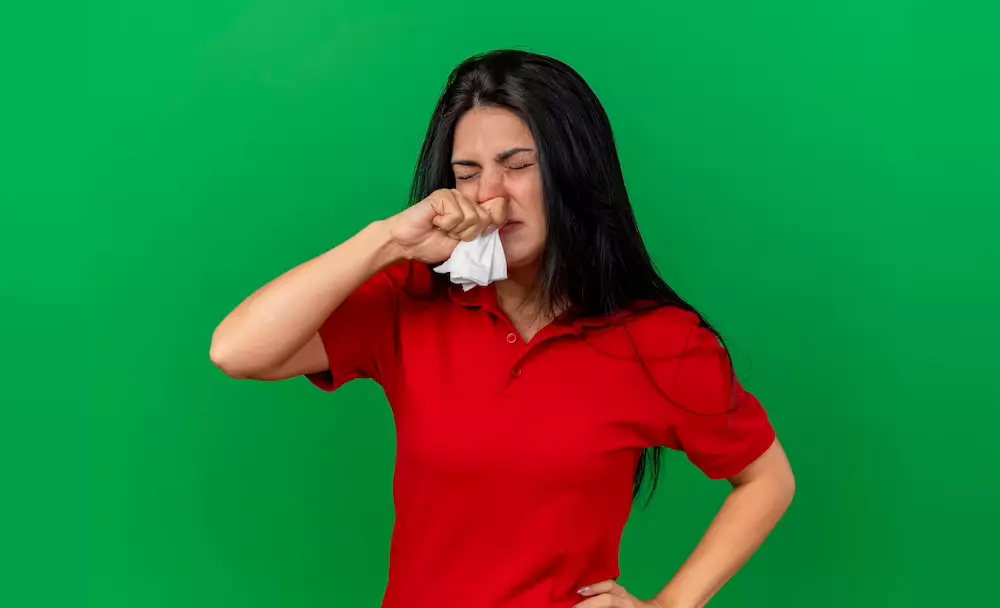This article is reviewed by an expert
As the term suggests, allergic rhinitis is an allergic reaction that is characterized by inflammation in the nasal passages. It is also known as hay fever and can be triggered by exposure to a wide variety of common allergens. A recent study reports that allergic rhinitis affects roughly 22 percent of India’s adolescents and has been steadily increasing in recent decades 1. In the general population, allergic rhinitis affects at least 30 percent of Indians and 15 percent even develop asthma 2.
What Are The Symptoms Of Allergic Rhinitis
Allergic rhinitis symptoms typically include 3:
- Sneezing: A sudden, involuntary expulsion of air through the nose and mouth.
- Runny or stuffy nose: Increased nasal secretions or congestion, which may alternate between the two.
- Itchy nose, eyes, or throat: A persistent urge to scratch or rub these areas.
- Watery eyes: Excessive tear production and redness.
- Coughing: Sometimes caused by postnasal drip.
- Fatigue: Feeling tired or having low energy due to disrupted sleep from nasal congestion.
These symptoms usually occur in flares that may be seasonal or throughout the year depending on the triggers.
Common Allergic Rhinitis Causes
Allergic rhinitis causes are not clearly understood, but we do know that it results from an abnormal immune system response. In such situations the immune system responds to allergens or irritants that may not be harmful as if they were a threat and it releases chemicals such as histamine into the bloodstream. This affects mucous membranes in the nose, throat and eyes to get inflamed and swollen, resulting in allergic rhinitis symptoms.
Recognizing common allergic rhinitis triggers and risk factors can help reduce the frequency and severity of symptoms. Common triggers can include 4:
- Pollen: Pollen from trees, grasses, and weeds is a common trigger for seasonal allergic rhinitis.
- Dust mites: These microscopic creatures are found in every household and their faecal matter and body fragments can trigger year-round or perennial allergic rhinitis.
- Animal dander: Allergens found in the skin flakes, urine, and saliva of animals, such as cats, dogs, or rodents, can cause allergic reactions in susceptible individuals.
- Mould spores: Mould can be found both indoors and outdoors, especially in damp and humid conditions. This is a major trigger for allergic rhinitis symptoms.
- Cockroaches: Certain proteins found in cockroach droppings, saliva, and body parts can act as allergens and trigger allergic rhinitis symptoms, particularly in urban areas.
- Irritants: Strong odours from perfumes or cleaning products, cigarette smoke and air pollution can irritate the nasal passages and trigger symptoms.
Home Remedies For Allergic Rhinitis
Allergic rhinitis treatment involves the use of a variety of medications including antihistamines, decongestants, corticosteroids, immunosuppressants and other medications. However, these treatments can only provide relief from symptoms and frequent use is associated with numerous side effects. This is why most people prefer to rely on natural home remedies for allergic rhinitis. Some of the most effective home remedies for allergic rhinitis include:
- Trigger Avoidance
This is a simple and effective lifestyle change that requires identification and avoidance of allergens that trigger allergic rhinitis. This is emphasized in both conventional medicine and natural medical systems such as Ayurveda.
- Jal Neti
The traditional Ayurvedic practice of nasal irrigation with a saline solution has often been recommended for allergic rhinitis, asthma and bronchitis. Modern clinical trials support the use of this allergic rhinitis treatment in Ayurveda, showing that it benefits both adults and children 5.
- Peppermint Essential Oil
Aromatherapy with essential oils like peppermint and eucalyptus can offer quick natural relief from allergic rhinitis and are highly recommended in Ayurveda. Research shows that peppermint oil works through its anti-inflammatory effects on the airways 6.
- Yoga
The practice of yoga is known to improve breathing and promote relaxation, in addition to other physical benefits. This can help lower the risk of allergic rhinitis as well as symptom severity. The recommendation is supported by research which shows that 8 weeks of hatha yoga training can improve allergic rhinitis management 7.
- Ayurvedic Herbs
A number of herbs that are used in Ayurvedic medicines for allergies can help treat or prevent allergic rhinitis symptoms as they contain anti-inflammatory, antihistamine, antispasmodic and immunomodulatory properties. This makes them a safe alternative to synthetic medications. Ingredients with proven efficacy include Haridra, Sunth, Kalonji, Tulsi and Jyeshtimadhu, among others 8,9,10,11.
Conclusion
For best results, it’s important to make comprehensive lifestyle changes and maintain consistent use of Ayurvedic treatments for at least a few months. If you find no relief within this time, it would be best to consult a skilled Ayurvedic physician as you may also suffer from an undiagnosed condition.
Disclaimer: The information provided in this article is for education and general awareness. It is not intended to substitute any medical advice. Please consult your healthcare professional for any medical information.
References:
- https://onlinelibrary.wiley.com/doi/10.1111/cea.14295
- https://www.ncbi.nlm.nih.gov/pmc/articles/PMC4460099/
- https://medlineplus.gov/ency/article/000813.htm
- https://www.ncbi.nlm.nih.gov/books/NBK538186/
- https://journals.sagepub.com/doi/abs/10.2500/ajra.2012.26.3787
- https://pubmed.ncbi.nlm.nih.gov/9889172/
- https://apjai-journal.org/wp-content/uploads/2022/05/7_AP-260419-0547.pdf
- https://www.ncbi.nlm.nih.gov/pmc/articles/PMC4190737/
- https://www.ncbi.nlm.nih.gov/pmc/articles/PMC3604064/
- https://www.ncbi.nlm.nih.gov/pmc/articles/PMC4296439/
- https://www.thieme-connect.com/products/ejournals/abstract/10.1055/s-2007-967126


















